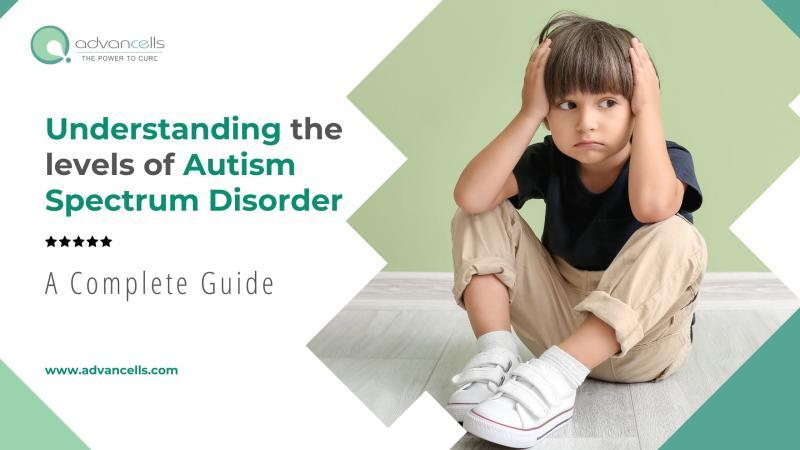Autism is a complex disorder that begins to develop in infancy and causes numerous social obstacles. A World Health Organization (WHO) research estimates that one out of every 100 children has autism. Autistic individuals also develop sleep and gastrointestinal disorders along with a critical impact on their mental well-being.
What is Autism?
Autism or Autism Spectrum Disorder (ASD) occurs due to inadequate development of the nervous system. The disorder refers to individuals with impaired communication skills and repetitive or restricted behaviors. It manifests in the early stages of life and its occurrence has risen to 1.5-1.8% globally. The underlying causes of the disorder are not known. However factors including the surroundings and genes contribute to autism.
Levels of Autism Spectrum Disorder
DSM-5 or ICD-11 has established the diagnostic criteria for autism. They have laid out essential guidelines for categorizing the severity of the disorder by the following:
-
Social communication
-
Restricted or repetitive behaviors
The classification of different levels of autism is the deciding factor in the levels of support for autistic individuals, such as- require mild support, substantial support, and very substantial support.
Level 1 Autism Spectrum Disorder
At this level, individuals show mild autistic features. Autism level 1 symptoms include limited initiation of social conversations. Their responses to social cues, such as body language or expressions, are also unsuccessful. For example, they can form full sentences but cannot continue a to-and-fro conversation. Repetitive behaviors exist but do not affect them significantly. The level 1 autistic individuals often exhibit inflexibility in behavior that affects their ability to plan, organize, and adapt to the environment. They might also show sensitivities to surrounding triggers like light or sound.
Level 1 individuals usually “require mild support” and can function in a relatively independent manner. Rehabilitation therapies, like behavioral therapy and occupational therapy, prove to be more suitable for these individuals and prepare them to handle social situations.

Level 2 Autism Spectrum Disorder
Level 2 autism spectrum disorder is marked by deficits in both verbal and non-verbal skills. Even in the presence of support in the form of parents or a caregiver, their lack of social skills is apparent. They find starting a conversation as well as responding to them quite challenging. Their repetitive or restricted behaviors are frequent and obvious. These behaviors interfere with their routine activities. In unfamiliar circumstances, they feel more stressed and anxious. For many people, switching to new pursuits is challenging. As a result, those with level 2 autism "need substantial support." To improve their quality of life, they need a variety of therapies, including occupational therapy, behavioral therapy, and speech therapy.
Level 3 Autism Spectrum Disorder
People with level 3 autism have reduced ability of verbal and nonverbal communication. They are not very good at starting conversations or responding to social cues. Furthermore, they experience distress and low capacity to operate as a result of their inflexible behavior and repetitive activities. Level 3 autistic individuals “require very substantial support” even for routine activities. They rely on their caregivers for communication and require constant attention. Generally, extensive support plans tailored to the individuals are proposed in such situations.
Level 1 Autism Spectrum Disorder in Adults
In general, autism is detected at an early age, but in some cases, it is diagnosed in the later stage when the individual has become an adult. The symptoms of level 1 autism in adults differ from those of a child. They exhibit difficulty in making conversations, maintaining friendships, understanding certain phrases (like idioms, sarcasm, etc.), comprehending emotional cues, and regulating emotions. Autistic adults prefer to be alone and learn anything in-depth, thus excelling in certain areas.
What is the Best Treatment for Autism Spectrum Disorder?
There is no definitive cure for autism. The current treatment approaches include therapies such as behavioral therapy, speech therapy, occupational therapy, and educational assistance, along with medication to reduce symptoms and treat the psychological conditions associated with the disorder.
Mesenchymal Stem Cells (MSCs) constitute an alternative therapy for autism. The research has shown noticeable improvements in the behavior, and social skills of autistic individuals after MSC therapy. The immune regulation property of MSCs has benefits in treating immune imbalance that damages the nervous system. Furthermore, MSCs secrete factors that promote nerve cell survival and proliferation. Their differentiation into nerve cells can potentially restore the nervous system damage.
Clinical Studies with MSC Therapy
There have been no adverse effects of the MSC therapy. A study by Sharifzadeh et al. in 2021 demonstrated statistically significant differences in social skills in autistic individuals after MSC administration. Sun et al. reported that infusion of umbilical cord MSCs decreased autism severity by 5 points and increased communication skills by 3 points, thus showing noticeable improvements.
Key Takeaways
The prevalence of autism has been growing in previous years. The lack of optimal treatment has urged scientists to search for novel therapeutic interventions. Since MSCs can differentiate into nerve cells, control the immune system, and shield nerve cells, they hold great promise for treating autism. Many people are encouraged by the treatment trials that have demonstrated improvements in the social abilities of autistic people. The MSC treatment seems to be a feasible alternative therapy for autism. Advancells, a premium manufacturer of stem cells in India, offers high-quality MSCs for therapeutic purposes.



